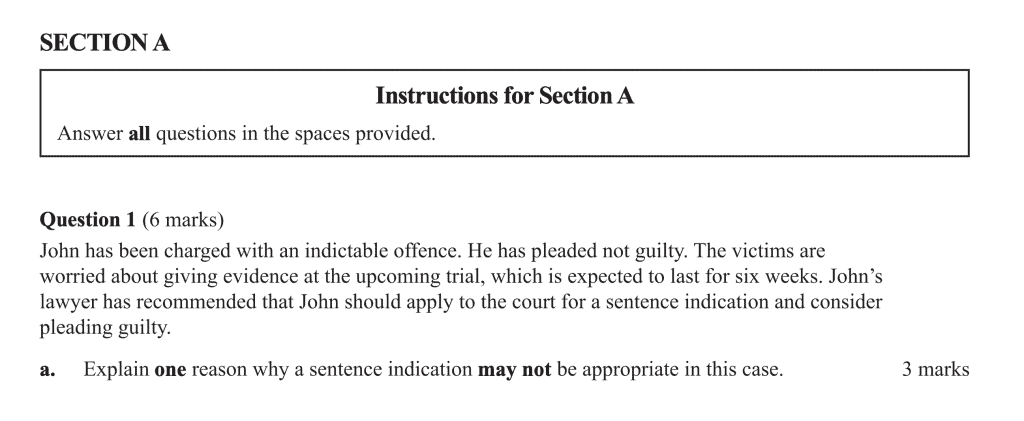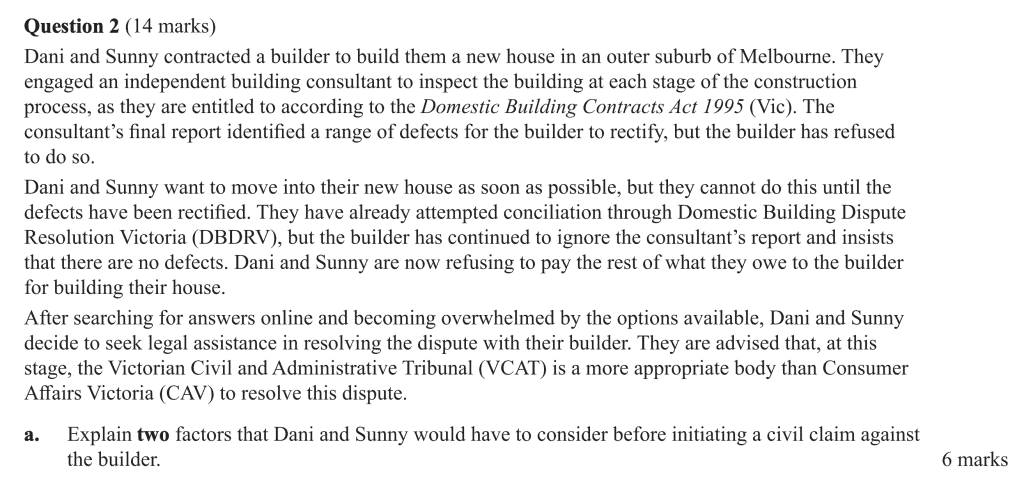Come the end of Units 3 and 4, your VCE Legal Studies exam determines 50% of your study score for VCE Legal Studies.
So, you’ll want to make sure you’re preparing for this exam all throughout the school year. We’ve got you covered with several tactics and skills that you can use to ace your end of year exam!
Let’s dive in!
How is the Exam Structured?
Studying For Your exam Throughout The Year
How Should I Revise?
Practice, Practice, Practice
Quick Exam Tips
How is the Exam Structured?
It’s important that you familiarise yourself with the way the exam will be structured, so that you don’t get any shocks when you open the paper!
In short, the VCE Legal Studies exam has two sections, section A and section B.
Section A consists of short answer questions and extended responses, with one of your extended responses being a 10 mark question.
Section B is similar, but unlike section A, all the questions will be in relation to scenarios.
These scenarios could be real or hypothetical. Both sections are worth 40 marks, which means that your exam will be worth 80 marks all up.
You’ll have 15 minutes of reading time and 2 hours of writing time to complete these questions.
Here are two examples of questions from previous exam papers:
Section A Question 1a of the VCE 2019 Legal Studies Exam Sourced From VCAA
Section B Question 2 of the VCE 2021 Legal Studies Exam Sourced From VCAA
Studying For Your exam Throughout The Year
Whatever you do, don’t cram a couple of days before the exam!
Doing well in Legal Studies is all about consistency and moderation.
You may not realise it, but technically, all the work you do throughout the year is already a form of study for your exam. All the content you learn or revise for your SACS could be content that comes up in your end of year exam!
Unsure how to study for the Legal Studies exam over the holidays? Here is a complete guide on how to balance rest and VCE study over the break!
It sounds obvious, but one of the best tricks to acing your exam is just revising content you’ve already learned.
It’s a good idea to revise all of your previous knowledge weekly. Set aside one day a week to go through old content.
In other words, even if you’re currently working towards your Unit 4 SACS, still put weekly time aside to revise content from Unit 3.
How should I revise?
In short, revise everything!
If you have a look at the VCE Study Design, it will lay out a heap of key concepts and ideas that you should know.
A great way to revise is making a study planner, or just deciding on a routine for study. One technique you could use is content vs context.
For example, on a Monday, you could decide to revise VCE Legal Studies exam content by memorising definitions, case studies or terms.
Then, a couple of days later, focus on putting the content into context, by doing practice exams and questions to nail down your technique for answering each question.
If you do this routinely, you will be in a great position for the exam, as the knowledge will start to become ingrained in your brain, so you’ll have an easier time applying it.
Make sure you organise all your content into sections. Everything you learn will fit under a specific area of study.
So, go through the study design or resources your teacher has given you and make sure you know what area of study they fall under.
Many students find it easier to put aside one night for each area of study.
Monday they might study Unit 4 AoS 1, and then on Tuesday they might do area of study 2. This can stop the content from feeling overwhelming, and can help you to study more efficiently.
Check out our practice SAC for VCE Legal Studies Unit 4 AOS 1 here!
Practice, Practice, Practice
Regularly attempt practice exams!
It is possibly the most beneficial thing you can do. You can always attempt a couple of practice exams open book, so that you can look at your notes if you forget certain content.
Do our 25 VCE Legal Studies Practice Questions with downloadable answers here!
Once you get more comfortable with the way exams are structured, try doing them in exam conditions, timed and with no notes.
Remember, you can’t use any books or notes in the exam!
And don’t forget! It’s okay to look for support and practice with someone who knows the syllabus cover-to-cover! Check out our expert local tutors in Glen Waverley today!
Quick Exam Tips
Tip #1: Respond to the Task Word
In each question, there will be a word that will guide your answer. This could be a word like discuss, analyse, compare or describe. For example, if a question doesn’t tell you to analyse something, then don’t!
Tip #2: Scrutinise the Question
Sometimes, a question will try to distract you by providing a lot of unnecessary information. Make sure you are being analytical in your reading, and looking for information that addresses the question.
Tip #3: Come Back to the Questions You Don’t Know
If you don’t know the answer to a question, then come back to it. In an exam, you should try to answer as many questions as you can, so don’t waste time trying to answer questions that you don’t have an answer to. Come back to it later, and write what you can.
Tip #4: Reference the Case Details!
If a question relates to an above case or scenario, reference it! When a question asks you to make reference to an above scenario or uses the names of characters from a scenario on the exam, make sure you use information from that scenario in your answer. The point of these questions is to see how well you can use source material.
Tip #5: Write Multi-Faceted Responses
When a question tells you to discuss something, make sure you create a multi-faceted response by addressing both strengths and weaknesses and/or various limitations. A great way to signal this kind of discussion is by using words like ‘however,’ ‘although,’ or ‘despite.’
Tip #6: Use paragraphs
It is so important that you use paragraphs in your longer responses. If a question uses a task word like ‘discuss,’ ‘analyse,’ or ‘evaluate,’ use paragraphs to organise all of your different points. This is especially important for the 10 mark question.
And, that’s how you ace your VCE Legal Studies exam!
Check out more of our VCE Legal Studies resources:
- The Ultimate 7 Day Study Plan for your VCE Legal Studies Exam
- VCE Legal Studies Unit 3 AOS 1 Practice SAC
- VCE Legal Studies Unit 4 AOS 1 Practice SAC
- What to Do the Night Before Your VCE Legal Studies Exam
- VCE Legal Studies External Assessment Practice Questions
Are you looking for some extra help with preparing for your VCE Legal Studies exam?
We have an incredible team of VCE tutors and mentors!
We can help you master the VCE Legal Studies study design and ace your upcoming VCE assessments with personalised lessons conducted one-on-one in your home or online!
VCE support for Legal Studies can be incredibly helpful! Find one of our tutors in Cranbourne today!
We’ve supported over 8,000 students over the last 11 years, and on average our students score mark improvements of over 20%!
To find out more and get started with an inspirational VCE tutor and mentor, get in touch today or give us a ring on 1300 267 888!
Maija Flood completed the VCE in 2021, so she knows how much work it can be. She is passionate about creating resources for students, and wants to help them feel confident about their studies! Maija is currently studying a Bachelor of Music at the University of Melbourne, and intends to major in clarinet performance.






